News & Media
Calling for a CODESA of education
“I urge young university students to not lightly flirt with terms like revolution and violent uprising. A revolution can be apt only where there is no real prospect for a democratic accommodation. There is no practical justification for delusions of toying around with an armed struggle within a stable society capable of democratic correction,” said Dikgang Moseneke, former Chief Justice of South Africa.
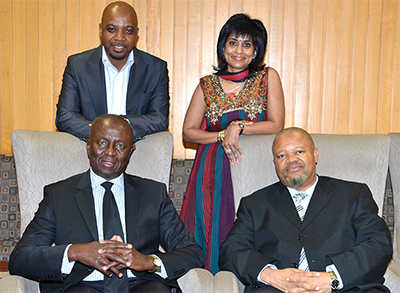
Pictured at Unisa’s Founders lecture on 27 July 2016 were, standing, Sakhi Simelane (Chairperson of Council, Unisa) and Prof Divya Singh (Vice-Principal: Advisory and Assurance Services, Unisa), and, seated, Justice Dikgang Moseneke (Former Chief Justice of the Republic of South Africa) and Prof Mandla Makhanya (Principal and Vice-Chancellor, Unisa).
He was speaking to the topic Is the claim that university fees must fall at odds with the democratic project? at Unisa’s Founders Lecture on 27 July 2016.
According to Moseneke, the debate about fees must fall compels us to start where it should—the South African Constitution. “This is so because it is emblematic of our collective convictions on the democratic project since 1994,” he said. “The demand for free access to further education, including university and FET education, is a good one. It is legally valid. However, like all fundamental rights, the entitlement to access to education is open to limitations,” Moseneke pointed out.
Violence is wholly unacceptable and must stop immediately
While conceding the constitutional and ethical validity of the call that fees must fall, important as it is, there are a number of issues that cannot take place, Moseneke believes. “The violence that has reared its head, connected to the demands that fees must fall, is wholly unacceptable and should stop immediately.”
Putting the issue into perspective, Moseneke explained that, in truth, universities can never rightly promise universal access to education. “That is not their task. Only the state can and must do so,” he explained. “The true counter party to the claim that fees must fall is the state. Universities are the wrong target,” he added, explaining further that we cannot afford to have university resources destroyed, only to need them again later on when peace returns.
A valid point, he highlighted, is that the call for the #FeesMustFall movement at universities is often framed in absolute terms. He said that is unclear whether all fees—tuition, textbooks, internet access, boarding, lodging, transport and pocket money—must fall? “Equally, it is uncertain, whether every student, irrespective of financial need, must be fully funded by the state. There are also crucial issues of time frames of free access to tertiary education within which it must be realised. Must it be now or nothing,” he questioned.
Prospect of heightened unrest is ominous
With the state conceding in broad terms but lacking such details, he feels this will pose further challenges. “I understand the stance of the state that the nation should await the outcome of the fees commission. But students in protest will not wait. This means that the prospect of heightened unrest during registration at universities in January 2017 is real and truly ominous,” he said.
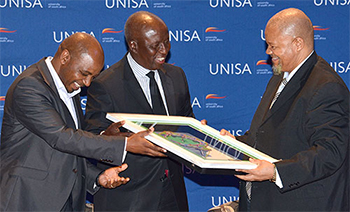
Sharing a light moment, Moseneke received a gift of appreciation for sharing his insights and thoughts at Unisa’s Founders Lecture. He is flanked by Sakhi Simelane (Chairperson of Council, Unisa), and Prof Mandla Makhanya (Principal and Vice-Chancellor, Unisa).
Moseneke is calling on a collective movement to set things straight. “What we need to collectively do, in my humble view, is convene a negotiating forum—a CODESA (Convention for a Democratic South Africa) of education. This should be convened by civil society and not the state,” he advised.
Here he believes that the policy and measures government will take thereafter will be responsive to, and enjoyed, in support of stakeholders in education. “After all, only government can formulate effective policy for necessary measures and only government has the money to fund access to high education.” According to Moseneke, responsiveness and cohesion, not coercion, are what we need to resolve this matter.
Transformation cannot take place in an environment of contestation
Also adding his voice to this platform was Prof Mandla Makhanya, Principal and Vice-Chancellor, Unisa. “What is needed is an authentically African conceptualisation of higher education. Such fundamental transformation cannot take place in an environment of contestation, violence and populist rhetoric from whatever quarter, nor can it take place with the rather superficial levels of intellectual engagement that seem to prevail currently. In reality, transformation requires a depth of engagement well beyond that which we are currently experiencing,” he said. The Vice-Chancellor believes that genuine transformation spans the theoretical, systemic, and cultural paradigms of education and society in a way that neither excludes nor demonises the so-called other on the basis of culture, language or religion.
The Founders Lecture was introduced at Unisa in 2003 and remains an unambiguous commitment to intellectual engagement that broadens our understanding and appreciation of higher education and higher education issues nationally, continentally, and globally, and that contributes meaningfully to the body of knowledge that informs and shapes higher education practice and development. The Founders Lecture is, above all, a dedicated space for intellectual enrichment—a space for sharing, learning and growing.
Publish date: 2016-11-07 00:00:00.0


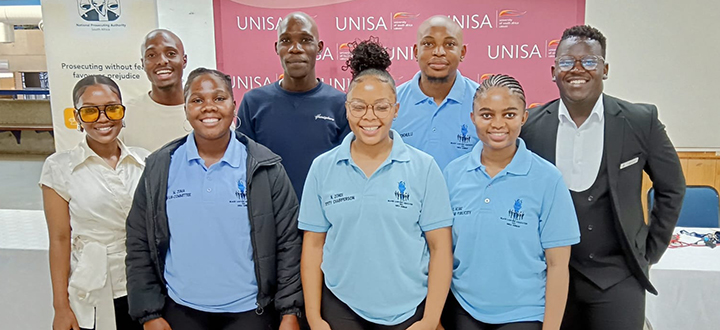 Unisa Law students gain a glimpse behind the scenes of their chosen profession
Unisa Law students gain a glimpse behind the scenes of their chosen profession
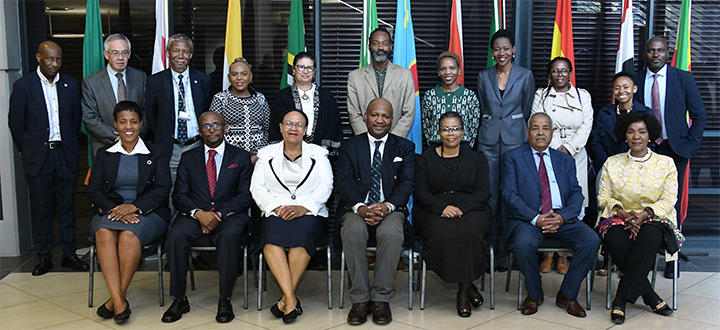 G20 to the people: Unisa and DIRCO launch Town Hall Outreach Programme
G20 to the people: Unisa and DIRCO launch Town Hall Outreach Programme
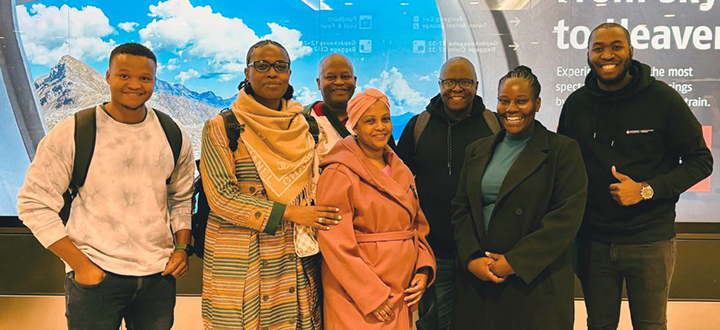 Unisa innovators making global waves in Switzerland
Unisa innovators making global waves in Switzerland
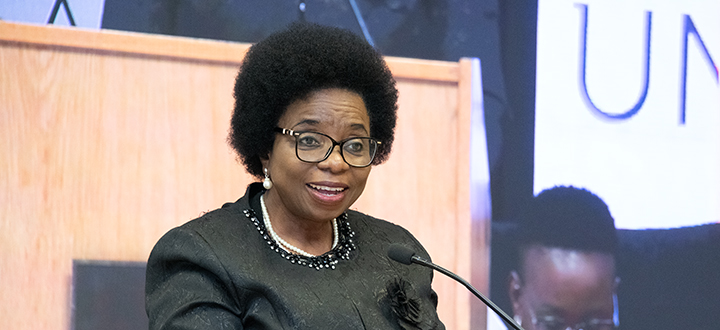 Future-proofing students for the coming digital wave
Future-proofing students for the coming digital wave
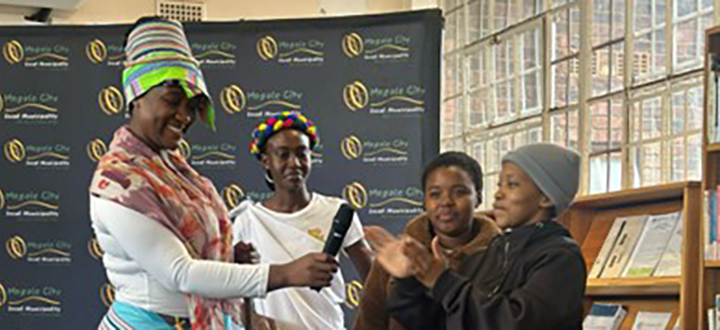 Unisa Library and Mogale City celebrate World Book and Copyright Day
Unisa Library and Mogale City celebrate World Book and Copyright Day